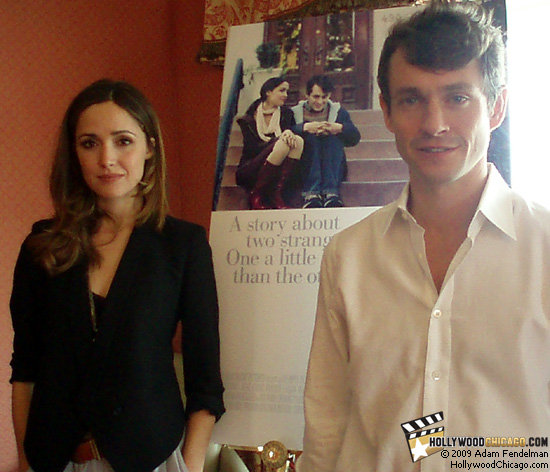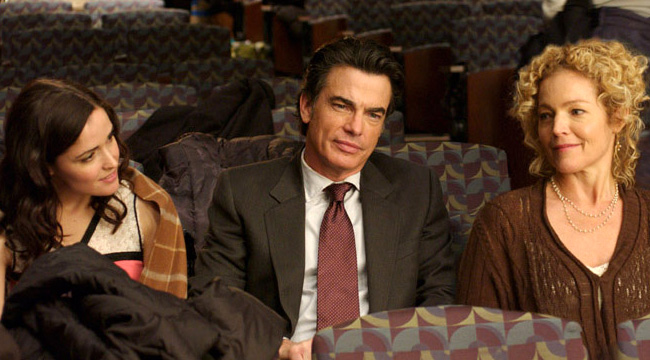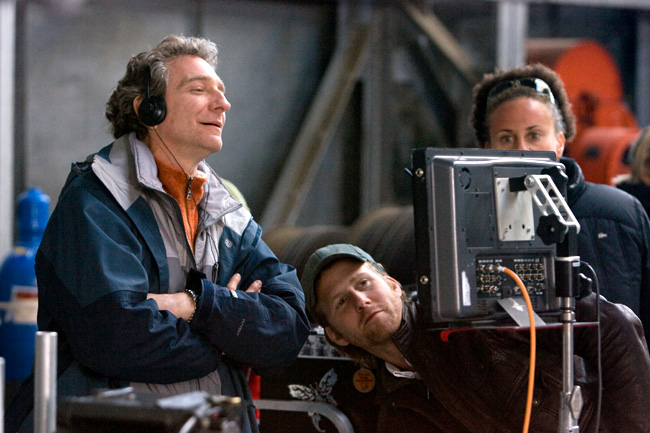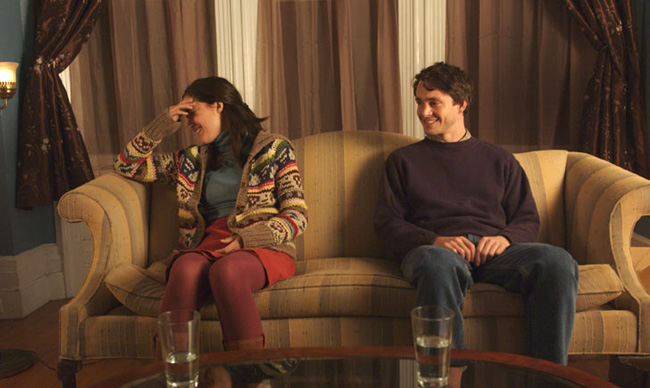CHICAGO – Patrick McDonald of HollywoodChicago.com appears on “The Morning Mess” with Dan Baker on WBGR-FM (Monroe, Wisconsin) on March 21st, 2024, reviewing the new streaming series “Manhunt” – based on the bestseller by James L. Swanson – currently streaming on Apple TV+.
Interview: Rose Byrne, Hugh Dancy For ‘Adam’ on Being ‘Mind Blind’ With Asperger’s
CHICAGO – People who have been diagnosed with Asperger’s syndrome, which is on the autistic spectrum, are sometimes described as being “mind blind”. In other words, they often don’t understand what people are thinking.
Rose Byrne and Hugh Dancy star in the film “Adam” to help audiences to visualize the condition, learn how to deal with it and metaphorically highlight it as just one way to understand typical misunderstandings in relationships.
“Adam” was released on DVD on Feb. 2, 2010. “Adam” star Rose Byrne is being buzzed about now with her return to TV’s “Damages” with Glenn Close. HollywoodChicago.com sat down with Rose Byrne and Hugh Dancy in Chicago to discuss the film.

Rose Byrne (left) and Hugh Dancy in “Adam”.
Photo credit: Fox Searchlight Pictures
HollywoodChicago.com: What does it actually feel like to be “mind blind”?
Hugh Dancy: I think it’d feel incredibly exhausting, frustrating and very difficult on a daily basis. You’re constantly working to try to translate and process what you’re hearing.
I’ve observed that some people with Asperger’s can take on enough rules – like broad and simple building blocks. As they progress, they can build on top of that in an ever-more refined way until they have a fairly complicated appreciation and understanding of neurotypicals (those who are not on the autistic spectrum) and normal social interaction. But it never becomes natural. It never becomes second nature.
It’s like talking to someone from a radically different culture than one’s own and not having any of the basic anthropological understanding by which to interpret what they’re saying or their attitudes. That’s why there’s all the more need for tolerance and empathy. It’s hard for them to make up the distance because they don’t have that natural empathic ability.
HollywoodChicago.com: There’s an important scene where Rose Byrne’s character (Beth) discusses whether or not Hugh Dancy’s character (Adam) is “boyfriend material”. Talk to me about that theory of mind.
Rose Byrne: There’s a great line that’s cut from that scene discussing theory of mind. In explaining the difference between someone with Asperger’s and someone without, Beth’s conclusion is: “…and that differs from other men how?” It highlights the fact that the film transcends just being an Asperger’s movie, which I don’t think is what (“Adam” writer and director) Max (Mayer) set out to do. Rather, it’s a film about relationships.
Hugh Dancy: It’s about making Asperger’s a romantic obstacle.
Rose Byrne: The human condition in general always presents challenges for people to understand each other.

Rose Byrne (left) and Hugh Dancy for “Adam” in Chicago on July 20, 2009.
Photo credit: Adam Fendelman, HollywoodChicago.com
HollywoodChicago.com: What initially attracted you to this script?
Hugh Dancy: The money and the size of the part. (joking) It was a dawning appreciation that it was one of the few you read that’s intelligent and well written. You keep hoping it’s not going to drop the ball. You keep hoping it gets to the end without disappointing you.
Though I knew nothing about Asperger’s at all in the beginning, I know enough about the structuring of scripts. I was impressed by Max choosing not to tell Beth and the audience that Adam has Asperger’s until a third of the way into the movie. That cemented my interest. When I met Max, he opened my eyes to what my job would be as an actor.
HollywoodChicago.com: Was Beth surprised to learn that Adam has Asperger’s?
Rose Byrne: Surprised, yes, but also relieved. She can’t quite figure out exactly what the difference is with this guy. He gets progressively more intriguing, but she’s also cautious.
HollywoodChicago.com: There’s a good scene where Adam is on a bench at night with Beth, and the next day on a couch, he asks her if she was sexual excited by him the night before. She says no.
Hugh Dancy: That’s the scene when Adam realizes he’s trying to reach out to her and overcome his mind blindness by not making an assumption that she was excited sexually. For him, he’s doing exactly the right thing. For her, it just reads as completely weird. In her attempt to leave, that’s when he tells her that he has Asperger’s. That scene is a really good example of the layering and how good Max’s writing is.

Left to right: Rose Byrne, Peter Gallagher and Amy Irving in “Adam”.
Photo credit: Fox Searchlight Pictures
HollywoodChicago.com: Talk to me about Adam’s freak-out scene amid the conversation of his home potentially being taken away from him.
Hugh Dancy: It’s not too far from the surface – that panic or that explosiveness – and it’s the frustration of him not understanding what’s going on. It surfaces when she invites him out with her friends and then later when she deceives him about the theater and meeting her parents.
HollywoodChicago.com: Adam has a need to be taken care of. It’s especially illustrated when he discusses moving to California and wants Beth to come with in order to take care of him.
Rose Byrne: There was a lady in an audience who had a son with Asperger’s. Her take on that scene was that Beth misunderstood Adam. She thought Beth didn’t understand that he just couldn’t express himself and he does love her. It depends on your perspective.
HollywoodChicago.com: Can there be mutual love in this kind of situation? Would Adam ever be enough for Beth?
Rose Byrne: That question is at the heart of this film.
Hugh Dancy: You have to be careful. While there’s a basic gulf that can be bridged, [that question] is always there for someone who’s down the autistic spectrum [with someone] who’s neurotypical. You confuse the issue by using words like “love” because we have a whole set of expectations, assumptions and understandings. When a relationship doesn’t fit into that, you think it can’t be love.

“Adam” writer and director Max Mayer.
Photo credit: Fox Searchlight Pictures
But if you talk about mutual respect, affection, understanding and the things that go into creating a relationship, then someone with Asperger’s is completely capable of those things. There are many, many, many examples of relationships between people with Asperger’s and neurotypicals – mainly Aspie men and neurotypical women – but it doesn’t make it easy. There’s a very high divorce rate.
In that case, the wives often need as much (if not more) support than the husbands. They’re both engaged in a mutual act of understanding and constant translation. The obstacles are much greater for people who were diagnosed much later in life.
Now you meet kids who are diagnosed at the age of eight or younger. They have loving parents who get them the help they need. They know who they are at a very early age. They can build the understanding they need to get through life. They’re going to have a better shot. In 10 or 20 years from now, I think there will be a much greater number of people with Asperger’s with better success in relationships.
HollywoodChicago.com: Is there a sense of elitism in people with Asperger’s? These are people who are often very intelligent but also socially awkward. Do people with Asperger’s sometimes think they’re smarter than neurotypicals?
Hugh Dancy: No. There’s a range of discussion here. Some people want to learn of the possibilities of cure. Some people are militant about it being acknowledged as a difference that comes with blessings as well we difficulties. I imagine those people would lean toward it coming with advantages or even superiorities. It’s basically our world and they’re forced to live in it. There’s not much room for them to feel superior because they’re grappling with a culture that’s hard for them to understand.
But we didn’t set out to make an educational film about Asperger’s. That wasn’t our motivation. When we were on set, we were thinking about these individuals and their relationship. It was just about their small story and using that as a metaphor for all of our relationships. But in concentrating on the story just between these two people, we reaffirmed a truth that’s central to people with Asperger’s or frankly with any kind of disability or difference: they are individuals.
If you know one person with Asperger’s, you just know one person with Asperger’s. I was trying to be more than just a collection of a symptoms and ticks so we could think about who this one man was.
HollywoodChicago.com: Do you see yourself more as a modest character actor rather than a celebrity?

Rose Byrne (left) and Hugh Dancy in “Adam”.
Photo credit: Fox Searchlight Pictures
Rose Byrne: Sure. I’m Australian. Probably to its detriment, we have a culture that says we shouldn’t think you’re too big for your boots.
Hugh Dancy: That’s the same with the United Kingdom. It’s that tall poppy syndrome.
HollywoodChicago.com: How is the Australian film industry different from Hollywood?
Rose Byrne: The film industry in Australia is tiny. Not many Australians see Australian films. It’s very hard to get the money. It takes years and years and years. It’s a government-funded process. It’s a completely different system.
While the U.S. has that independent side to it, it also has the studio system. You can’t compare the size of the two industries. But when you get to the script and the acting, it’s still the same experience for me whether it’s in Australia or the United States. People usually want escapism in a film. Most films are either remakes or a sequel. Unlike this one, there aren’t many original films.
HollywoodChicago.com: Hollywood often feels that original scripts are financially dangerous because there isn’t a built-in audience.
Hugh Dancy: I think you’re right. Other than blaming people for their actual taste, which gets into deep water, our entire culture is geared toward feeding people with an easily digestible product. It’s the media as much as the Hollywood channel that produces it. If I want to see a small film that’s more challenging and character driven, though, there’s still plenty to see. Still, I might bemoan the fact that there aren’t more people in the audience with me.
 | By ADAM FENDELMAN |


